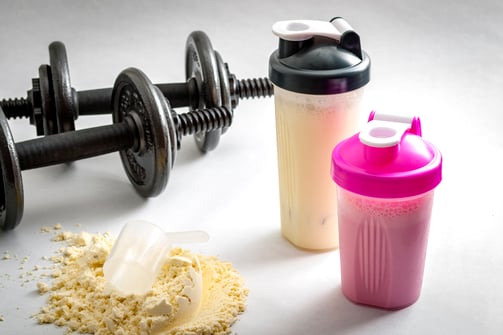Protein is one of the essential macronutrients the body needs. Because the body cannot produce it on its own, we must acquire protein through our diet. It plays a critical role in muscle repair, immunity, and satiety—making it an important part of daily nutrition.
Muscle Repair
Exercise breaks down muscle tissue, creating microscopic tears. Amino acids from the protein you consume help repair and rebuild this tissue, leading to stronger muscles over time. Without adequate protein intake, the repair process becomes inefficient and may limit muscle growth.
Immunity
Your immune system depends heavily on protein. Immune cells—such as white blood cells and antibodies—are built using amino acids. Without enough protein, your body produces fewer of these protective cells, increasing your susceptibility to illness.
 Satiation
Satiation
Protein also helps regulate appetite. When you’re hungry, your body releases the hormone ghrelin, signaling the need to eat. Eating protein reduces ghrelin levels and increases hormones like GLP-1 and peptide YY, which promote fullness.
Protein also has a higher thermic effect than carbohydrates or fats, meaning your body burns more calories digesting it. This can help reduce cravings and prevent overeating.
Snack Ideas
Getting enough protein isn’t always easy—especially with fast-paced schedules. Here are some convenient, protein-rich snack and meal ideas to help you meet your goals.
- Greek yogurt parfait: Combine Greek yogurt, berries, and granola for a quick, portable option that supports your nutrition needs.
- Tuna options: A tuna wrap or tuna with whole-grain crackers provides a lean, high-quality protein source that fuels a busy day.
Vegetarian Options
For those following a vegetarian diet, a quinoa bowl is an excellent base. Quinoa is a complete protein, offering all essential amino acids. Lentil soup or lentil salad are also great plant-based sources of protein and fiber.
Athletes
Athletes engaged in intense training need consistent protein intake for proper recovery. A classic chicken-and-rice meal offers lean protein and complex carbohydrates for sustained energy. When time is limited, a high-quality protein shake can be a convenient way to meet daily needs. Visit a local nutrition store to find a mix that aligns with your goals.
While meeting nutrition needs can be challenging, ensuring your body gets enough protein is essential for performance, recovery, and overall wellbeing. Incorporating protein-rich foods into your daily routine can support muscle repair, strengthen your immune system, and help maintain a balanced, satisfying diet.

 You can also obtain creatine through supplements.
You can also obtain creatine through supplements. 
 The benefits of strength training apply to individuals of all fitness levels, whether you're a professional athlete, a working adult, or an older adult looking to improve daily function and quality of life. Anyone can benefit from full-body strength training 2-3 days a week at moderate to high intensity for about 30 to 60 minutes. Here are several reasons why you should consider incorporating strength training into your weekly routine.
The benefits of strength training apply to individuals of all fitness levels, whether you're a professional athlete, a working adult, or an older adult looking to improve daily function and quality of life. Anyone can benefit from full-body strength training 2-3 days a week at moderate to high intensity for about 30 to 60 minutes. Here are several reasons why you should consider incorporating strength training into your weekly routine.
 As we get into the season of gratitude, it’s the perfect time to think about how we can strengthen our bodies and minds. This November, we’re super excited to kick off the holiday season with a Planksgiving Challenge! Whether you’re a fitness pro or just starting out, planks are a fantastic way to build your core strength, improve posture, and up your overall fitness game.
As we get into the season of gratitude, it’s the perfect time to think about how we can strengthen our bodies and minds. This November, we’re super excited to kick off the holiday season with a Planksgiving Challenge! Whether you’re a fitness pro or just starting out, planks are a fantastic way to build your core strength, improve posture, and up your overall fitness game.



 Conjugate training is a term coined and expanded upon by the late, great Louie Simmons, a well-known strength coach at
Conjugate training is a term coined and expanded upon by the late, great Louie Simmons, a well-known strength coach at 
 Thousands of sports nutrition supplements are touted to improve strength, endurance, and a variety of other athletic factors. But do they work and are they necessary? Below are some of the most common supplements advertised for athletes, as well as what they do, how well they work, and how much is safe to supplement. It’s important to note that you should always consult your physician or a registered dietitian specializing in sports medicine before starting any new supplement.
Thousands of sports nutrition supplements are touted to improve strength, endurance, and a variety of other athletic factors. But do they work and are they necessary? Below are some of the most common supplements advertised for athletes, as well as what they do, how well they work, and how much is safe to supplement. It’s important to note that you should always consult your physician or a registered dietitian specializing in sports medicine before starting any new supplement. With the world now instantly accessible through technology, it’s easy to understand why a growing number of people expect things to be done in a shorter amount of time. Like many others, I’m a big fan of things that are fast and effective, and that includes my workouts. High-intensity circuit training does just that by providing an effective and convenient way to increase exercise results in less time.
With the world now instantly accessible through technology, it’s easy to understand why a growing number of people expect things to be done in a shorter amount of time. Like many others, I’m a big fan of things that are fast and effective, and that includes my workouts. High-intensity circuit training does just that by providing an effective and convenient way to increase exercise results in less time.  The first thought that comes into most people’s heads when they hear the word weightlifting is, more times than not, “bulky.” The perception is that heavy weightlifting will cause an undesired large gain of muscle mass. This is true; weightlifting will cause you to put on muscle mass, but it will take a lot more than just lifting weights to be “bulky.” Please do not let your goals steer you away from certain exercises.
The first thought that comes into most people’s heads when they hear the word weightlifting is, more times than not, “bulky.” The perception is that heavy weightlifting will cause an undesired large gain of muscle mass. This is true; weightlifting will cause you to put on muscle mass, but it will take a lot more than just lifting weights to be “bulky.” Please do not let your goals steer you away from certain exercises.